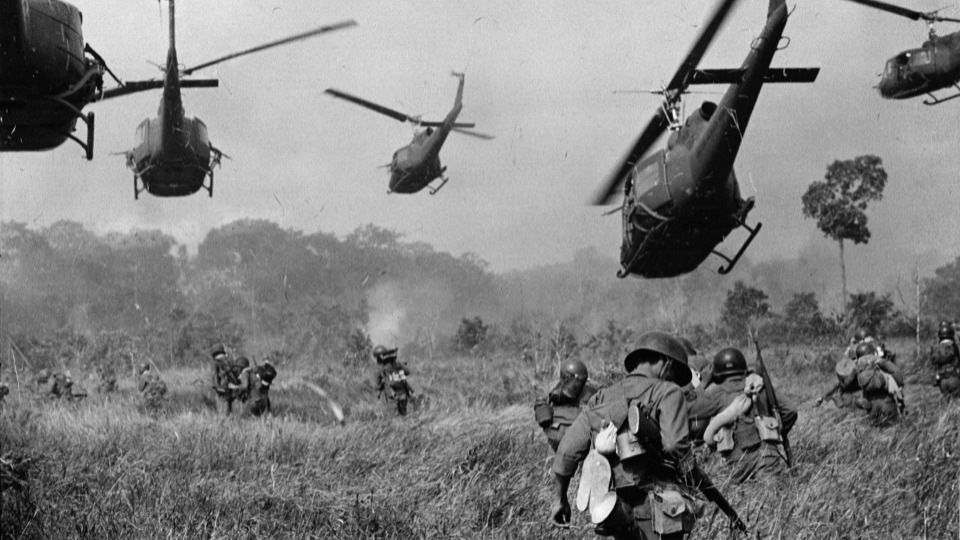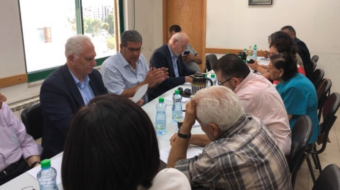
Mainstream history books portray United States foreign policy in benevolent, glowing terms: American governments have always been dedicated to freedom, democracy and human rights, promoting these ideas and values abroad. In Washington Bullets: A History of the CIA, Coups, and Assassinations, Vijay Prashad challenges these assertions in his short history of U.S. imperialism.
Since the foundation of the U.S., and well before the emergence of modern Republican and Democratic parties, governments have pursued policies of expansionism, conquest, and empire building, according to Prashad. In 1823, President James Monroe announced that Latin America and the Caribbean were now under U.S. control. In its presumptive “backyard,” the U.S. went to war with Mexico in the 1840s and seized one-third of the country. Earlier, in 1812, it had made a similar, but unsuccessful attempt with Canada, then under British control.
When countries pursued independent policies that Washington disagreed with, they were dealt with brutally. In 1912, the president of Nicaragua attempted to create a Federal Republic of Central America and with the help of Germany build a canal that would compete with the U.S.-controlled Panama Canal. U.S. Marines invaded the country, deposed the president and stayed for 20 years.
After World War II, the U.S. expanded and maintained its hegemony less through military invasions and more by encouraging or organizing coups that installed subservient governments. In Guatemala, the government of Jacobo Arbenz in 1953 nationalized idle lands owned by the U.S. multinational United Fruit Company to distribute to landless farmers. When U.S.-backed mercenaries failed to overthrow the government, CIA officials warned Guatemalan army commanders that the U.S. military would invade if they did not depose the duly elected reformist government. Military officers drove Arbenz to the airport and forced him to undress in an act of humiliation before being allowed to fly to Mexico, where he was granted political asylum. For the next 40 years the country would be governed by repressive military juntas. The bananas kept coming.
Also in 1953, the U.S. organized a successful coup against the reform-minded government in Iran which nationalized the British-owned oil industry. In the 1960s and ’70s, the CIA overthrew leftwing governments in Brazil, the Dominican Republic and Chile, among other places. Prashad recites an old joke: “Why has there not been a coup in the U.S.? Because there is no U.S. Embassy there.”
We all know about recent U.S.-backed coups against Evo Morales in Bolivia and Bertrand Aristide in Haiti, but the world does not know the same thing happened in Japan. Prashad reveals how the Obama administration forced the Japanese Prime Minister to resign in 2010 after he demanded that the U.S. remove its military bases from the Japanese island of Okinawa.
The U.S. also ensured that global trade, finance and development were controlled by U.S.-dominated institutions. The American dollar became the central currency of the global economic system. “If any country displeased the U.S. government, and if a regime of sanctions were put in place, this institutional architecture could throttle any government, wiping out lines of credit, making it impossible to sell its goods and settle payments,” writes Prashad. “No system outside the control of the U.S. government was allowed to remain in place.”
One obstacle the Americans faced was the emergence of strong communist and left-leaning nationalist movements and parties after 1945. The Soviet Bloc, with the help of a USSR recovering from the war, created another economic and political model outside of U.S. control. In some places in the so-called “Third World” where new nations were born out of their colonial past, that model offered viable alternatives, resulting in a series of local “proxy wars,” each side backed by one of the great superpowers.
Such left-wing movements grew strong, and even came to power in some countries. To eliminate such opposition, the U.S. government worked with military juntas from Brazil to Bolivia to Argentina to Colombia to abduct, torture and kill communists, socialists and human rights advocates during Operation Condor in South America that ran from 1975 to 1989. It would result in 100,000 deaths, the imprisonment of 500,000, and the handing off of babies born to pregnant activists for adoption.
The U.S. encouraged the 1965 military coup against the left-leaning nationalist government of Indonesia that had been supported by the country’s powerful Communist Party. The U.S. and Australian embassies provided the Indonesian army with lists of vaguely identified “communists” who had to be executed. In a short period, soldiers killed an estimated 1 million CP members and sympathizers. Rivers ran red with their blood as bodies floated out to sea. “Whether in Guatemala or in Indonesia, or by the 1967 Phoenix program in South Vietnam, the U.S. egged on local oligarchs, and their friends in the armed forces to completely decimate the left,” writes Prashad.
In the Middle East, the CIA encouraged Saudi Arabia to form the Muslim World League in 1962 to organize people on the basis of fundamentalist religion. This organization, amply funded with Saudi oil money, would preach the gospel of Islam and seek to turn young people inward, against anti-colonialism, communism and trade unionism in countries with large numbers of Muslim communists or where powerful anti-colonial movements had taken power.

Prashad sheds light on how the U.S. used terror and murder to achieve its goal of weakening left governments and movements in the postwar years, citing a chilling 19-page CIA document on Guatemala titled “A Study of Assassination” distributed in 1953. “No assassination instructions should ever be written or recorded,” says the study. “Decisions must be made in the field and kept there. There is a list of tools that can be used in an assassination, from hammers to kitchen knives, anything hard, heavy, and handy will suffice. Absolute reliability is obtained by severing the spinal cord in the cervical region, which can be done by a knife. Persons who are squeamish should not attempt it.” The CIA would continue to produce such studies for U.S.-friendly military regimes and paramilitary forces abroad, with ample results.
After the dissolution of the USSR and the Eastern European socialist bloc in 1991, the U.S. according to Prashad has become even more aggressive. The socialist bloc had provided military protection as well as economic aid to countries that broke from the capitalist model. Those socialist countries remaining in the “Third World” were left to fend for themselves. The U.S. would invade Iraq and Afghanistan, bomb former Yugoslavian states and Libya, and finance a brutal contra war against Syria. “Pressure has built up on China and Russia,” writes Prashad, “through expansion of NATO into Eastern Europe and with the buildup of U.S. forces in the Pacific Rim region.”
Those countries that will not submit to the U.S. such as Cuba, Syria, Venezuela, Belarus, Iran and North Korea are subject to crushing economic sanctions. Prashad cites one study reporting that U.S. sanctions against Venezuela have killed at least 40,000 people because the country could not import certain key medicines. Prashad suggests that the U.S. has gone after Venezuela (which has vast oil reserves and is generous in helping struggling neighboring countries) to weaken and destroy Cuba, which has strong trade ties with the South American nation.
Washington Bullets, written in beautiful prose, provides a myriad of interesting stories and details about American foreign policy and interventions. This slim volume is especially recommended for beginners seeking an introductory course on U.S. imperialism.
Vijay Prashad
Washington Bullets: A History of the CIA, Coups, and Assassinations
New York: Monthly Review, 2020, 162 pages
Paperback $17.00, clothbound $89.00
Paperback ISBN: 978-1-58367-906-7
Cloth ISBN: 978-1-58367-907-4












Comments